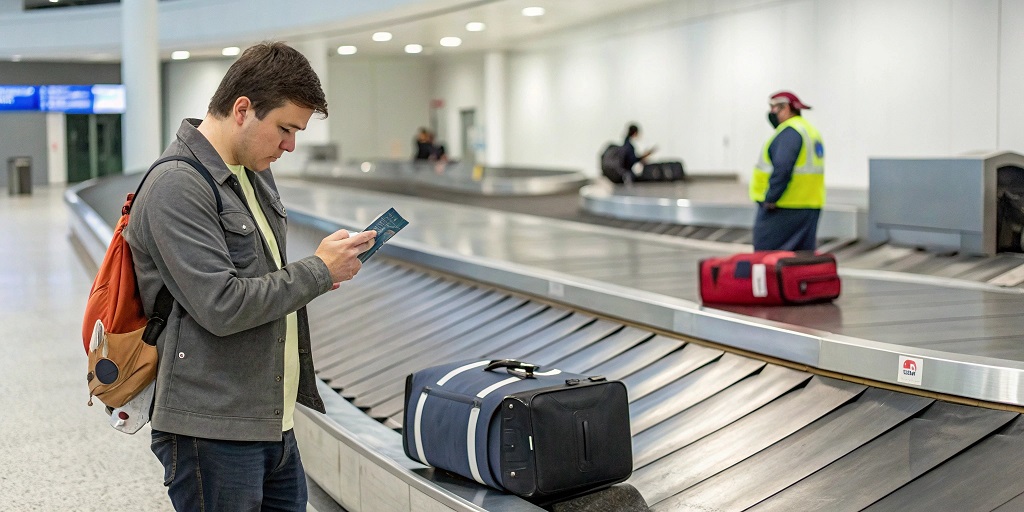Losing luggage at the airport can feel overwhelming, but quick action can make a difference. Whether you’re stranded without clothes or essential items, knowing the right steps can help you recover your belongings or get compensation. Contact Airport Gurus for expert assistance in navigating this stressful situation. This guide outlines practical steps to take when your luggage goes missing, ensuring you stay calm and proactive. From reporting the loss to filing claims, we cover everything you need to know. Read on to learn how to handle this travel mishap effectively and reduce stress.
Stay Calm and Act Quickly
When you realize your luggage is missing, staying calm is crucial. Panic can cloud your judgment and delay action. Head to the airline’s baggage claim desk immediately. Most airports have a lost luggage counter near the baggage claim area. The sooner you report the issue, the better your chances of recovering your belongings. Airlines often locate misplaced bags within hours if reported promptly.
Additionally, gather any relevant documents before approaching the desk. Your boarding pass, luggage tag, and flight details will help the staff track your bag. Be clear and concise when explaining the situation. Provide a detailed description of your luggage, including its size, color, and any unique features. This information speeds up the search process and reduces confusion.
File a Lost Luggage Report
Filing a formal report is the first official step. At the baggage claim desk, ask for a Property Irregularity Report (PIR). This document records the details of your lost luggage. Fill it out accurately, including your contact information and travel itinerary. The airline will assign a tracking number to monitor your case.
Moreover, keep a copy of the PIR for your records. Ask the airline staff about their process for locating bags and expected timelines. Some airlines offer online tracking systems, so inquire about this option. If your luggage isn’t found quickly, the report becomes essential for claiming compensation later. Therefore, ensure all details are correct before submitting.
Understand Your Rights as a Passenger
Knowing your rights can empower you during this process. Under international agreements like the Montreal Convention, airlines are liable for lost or delayed luggage. For international flights, you may be entitled to compensation up to approximately $1,700, depending on the circumstances. Domestic flights have similar protections, but rules vary by country.
Furthermore, check the airline’s policy on lost luggage. Some offer interim relief, like reimbursing essential purchases (toiletries, clothing) while you wait. Keep receipts for these expenses, as they’re often required for reimbursement. If the airline fails to resolve the issue, you can escalate the matter to regulatory bodies. Understanding these rights ensures you’re fairly compensated.
Key Passenger Rights
- Compensation: Up to $1,700 for international flights under the Montreal Convention.
- Interim Relief: Reimbursement for essentials like toiletries or clothes.
- Tracking: Access to updates on your luggage’s status.
Track Your Luggage Progress
After filing the report, actively monitor your luggage’s status. Many airlines provide online portals or apps to track your bag using the PIR number. Check these regularly for updates. If no progress is made within 24 hours, contact the airline directly. Persistent follow-ups show your urgency and keep your case active.
Additionally, call or email the airline’s baggage service team for updates. Be polite but firm, as staff handle multiple cases daily. If your luggage is located, confirm delivery details, such as timing and location. Some airlines deliver to your hotel or home, while others require you to return to the airport. Staying proactive ensures quicker resolution.
What to Do While Waiting
While waiting for updates, take practical steps to manage without your luggage. Purchase essential items like toiletries, underwear, or a change of clothes. Most airlines reimburse reasonable expenses, so keep all receipts. Avoid extravagant purchases, as airlines may question their necessity. Focus on what you need to continue your trip comfortably.
Moreover, inform your hotel or host about the situation. They may offer amenities like toiletries or laundry services. If you’re traveling for business, notify your employer or clients about potential delays in accessing important items. Staying organized during this period reduces stress and helps you focus on the next steps.
File a Claim for Compensation
If your luggage remains missing after a few days (typically 21 days for international flights), it’s considered lost. At this point, file a compensation claim with the airline. Provide the PIR, receipts for essential purchases, and a detailed list of items in your bag. Include their estimated value to support your claim.
Furthermore, submit the claim within the airline’s specified timeframe, usually 7–21 days after the loss. Be thorough, as incomplete claims may be delayed or rejected. If the airline’s response is unsatisfactory, consider escalating to a consumer protection agency or small claims court. Persistence is key to securing fair compensation.
Steps for Filing a Claim
- Gather PIR, receipts, and item list.
- Submit within the airline’s deadline.
- Follow up if no response is received.
Prevent Future Luggage Loss
Preventing future losses starts with preparation. Label your luggage clearly with your name, phone number, and email address. Use a sturdy tag and place a copy of your contact information inside the bag. This helps airlines identify and return your luggage quickly if it’s misplaced.
Additionally, consider using a tracking device like an AirTag or Tile. These gadgets allow you to monitor your bag’s location in real-time. Pack essentials in your carry-on, such as medications, valuables, or a change of clothes. This ensures you’re not stranded if your checked luggage goes missing. Finally, take a photo of your bag before checking it in for easy identification.
Insurance and Lost Luggage
Travel insurance can be a lifesaver when luggage is lost. Many policies cover lost or delayed baggage, offering reimbursement for essentials or permanent loss. Check your policy before traveling to understand coverage limits. Some credit cards also provide baggage loss protection if used to book your flight.
Moreover, file a claim with your insurer promptly. Provide the PIR, receipts, and any airline correspondence. Insurance claims can supplement airline compensation, especially if the airline’s payout is limited. However, read the fine print to avoid surprises. Investing in travel insurance before your trip adds an extra layer of security.
When to Seek Professional Help
If the airline is unresponsive or your claim is denied, professional help may be necessary. Organizations like Airport Gurus specialize in resolving travel issues, including lost luggage. They can negotiate with airlines, file claims, or escalate cases to regulatory bodies on your behalf. Their expertise saves time and reduces stress.
Furthermore, professional services are useful for complex cases, such as high-value items or international flights. Research reputable companies and check reviews before engaging their services. While most cases are resolved directly with the airline, having expert support ensures you’re not left empty-handed.
Conclusion
Losing luggage at the airport is frustrating, but taking immediate action can lead to a positive outcome. By staying calm, filing a report, and understanding your rights, you increase your chances of recovering your belongings or securing compensation. Tracking progress and preparing for future trips also minimize stress. With these steps, you can navigate this travel hiccup confidently. Have you ever lost luggage? Share your experience or tips in the comments below, or share this article to help others!




Leave a Reply